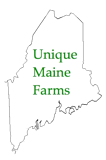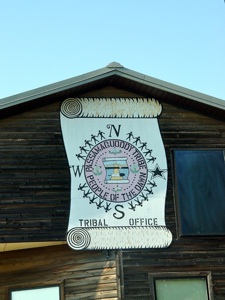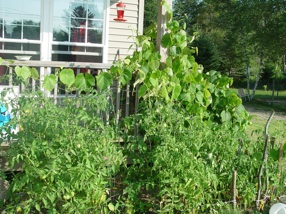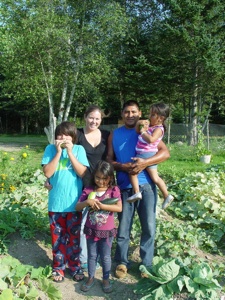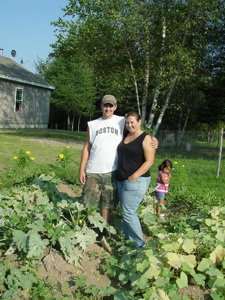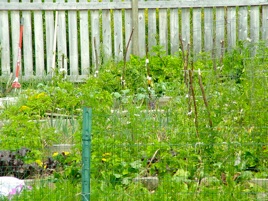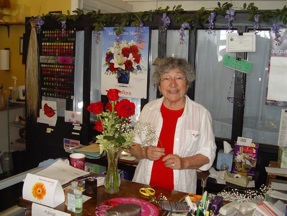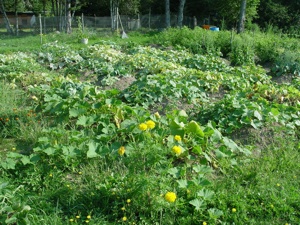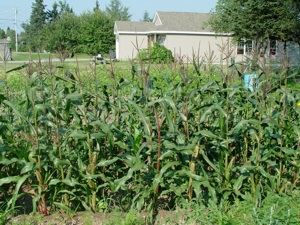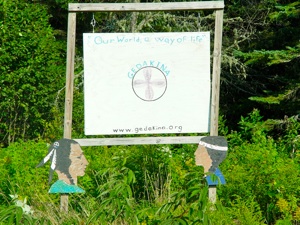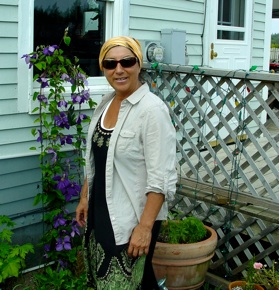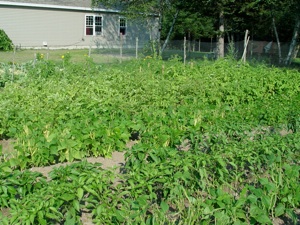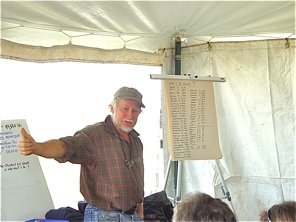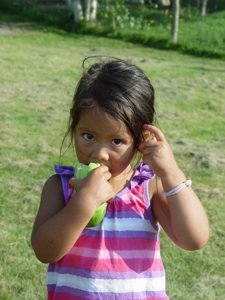Name: Passamaquoddy Food Sovereignty
Address: Vera Francis
Passamaquoddy Tribal Office
9 Sakom Road
Pleasant Point, Maine 04667
Mailing Address:
Passamaquoddy Tribal Office
P.O. Box 343
Perry, Maine 04667
Phone: 207-853-2600
Email: vfrancis@wabanaki.com
Website: www.wabanaki.com
Products and Services:
-assistance with establishing home gardens
-workshops
-nutrition education
-raised beds
-community garden
What Makes The Passamaquoddy Food Sovereignty Program Unique?
Integral to the Passamaquoddy Nation is a bond with the land, the forests, the rivers, the lakes, and the ocean. The ability of the Passamaquoddy People to access food from their natural surroundings can be traced back thousands of years. Even their Tribal name of “Peskotomuhkat” is associated with the gathering of food from nature as it means “those of the place where pollock are plentiful.”
Outside of the Tribal Office at Pleasant Point there is a sign that says “Gedakina - Our world, a way of life.” This refers to an endeavor to strengthen and revitalize the culture and identity of Native People. It is tied in with the conservation of natural resources and sacred lands. The concept of being “keepers of the earth” is promoted.
Unique Maine Farms had the opportunity to meet with Vera Francis, the Community Planner and Economic Development Director at the Passamaquoddy Reservation this past August. In her efforts to focus on many of the critical environmental issues that relate to the Passamaquoddy People and in the way that she lives, she is a true “keeper of the earth.”
Vera has worked tirelessly to restore the health of Passamaquoddy Bay. She explained that the ability to “access food and fish is vital to our spiritual and cultural sustenance.” She worked for many years to keep LNG out of the area and established the non-profit group N’tutlankeyutmonen N’kihtaqmikon which means “We are taking care of our land.” In 2010, Vera was awarded the People’s Choice Award by the Natural Resources Council of Maine.
Honoring and protecting the natural resources
for use by future generations has been intrinsic to the Passamaquoddy People. Vera Francis has played a major role in supporting the idea of a Food Sovereignty program on the Sipayik Reservation. According to Elizabeth Sprague, the former Program Manager of the Wabanaki Business Innovation Center at Four Directions Development Corporation, Vera had been talking with The People for over a year about growing, preserving, and sharing food in the community.
Vera reminisced about the influence of her Grandmother. She described her as a person who
commanded that food come to the home. It was expected that fish would be caught and plants such as berries, herbs, and sweet grass would be harvested. There was a pride in the ability to choose food that was based on a sense of culture. Vera discussed that the concept of food was “not just about having enough, but also about sustaining our very being, our cultural lifeways.” She explained the idea of how traditional knowledge will enable Tribal members to have a sense of vibrancy and the ability to enjoy longevity.
Plansowes Dana and her husband, Javier Lopez, and their children, Petak, Sigon, and Maya, maintain a beautiful large garden at their home at Sipayik. Plansowes has been one of the lead people in the Food Sovereignty program on the Passamaquoddy Reservation.
Plansowes grew up on the Sipayik Reservation. There were six children in the family. Gardening and preserving food were always part of the home. There was always plenty of food. Plansowes feels that it is important for The People to get back to the traditional ways. The Dana-Lopez garden completed its seventh season in 2013. The family takes pride in growing their own food. They have planted and tended strawberries, grapes, watermelon, cantaloupe, a large variety of vegetables, and garlic. They also planted five fruit trees and enjoy the apples from four apple trees that were already established on their property.
Plansowes will be establishing the community garden for the Tribe at the Tribal Farm on the Golden Road in Perry. Some haying has taken place at the farm and one of the Tribal members has pastured their horses there. Plansowes explained that the community farm will enable Tribal members who don’t have raised beds or access to enough space to grow any kind of vegetables and crops such as potatoes and corn. Rhonda Stevens, a teacher at the Beatrice Rafferty School on the Passamaquoddy Reservation, has been bringing her students to the Tribal Farm to prune the apple orchard and try to bring it back.
Hilda Lewis, is an enthusiastic supporter of the Passamaquoddy Food Sovereignty project. She is the owner of Bz Bee Floral Designs in Eastport. Her grandfather always tended a garden and she remembers enjoying the string beans, cucumbers, squash, and peas. Her grandmother and mother preserved all types of food. She recalled the long project of sterilizing all the jars and her grandfather’s special recipes for the pickles and the cucumbers in the crock. When she was ten years old she planted her first garden of radishes. She recalled how the grandfather of Grace Dana, who lived across the street, preserved cranberries and currants. There was a root cellar. In later years when Hilda lived in Ohio, she maintained a garden with corn, cukes, tomatoes, and peppers and zucchini. She canned tomatoes, preserved peaches, and made jams and jellies.
Hilda elaborated on the importance of the Food Sovereignty program. She explained how significant it was to have the opportunity to feed yourself and not have to depend on food from grocery stores. In her opinion, knowing where your food originated is extremely important. She is leery of vegetables that have been shipped from far away and appreciates that homegrown vegetables have no preservatives. Circumstances during the past year prevented her from being around her garden, but her face lit up when she explained how she was already planning a “good, solid garden” for next year. Her raised bed garden is situated adjacent to the raised gardens of her relatives-Jane, Lena, and David.
As part of the Four Directions Development Corporation’s funded work on Tribal food sovereignty, the Four Directions staff members, Alivia Moore and Elizabeth Sprague reached out to The People to organize a community gathering and discussion about matters of food access and growing food within the community. Alivia Moore and Vera Francis organized the community meetings.
In the early spring of 2012, members of the Passamaquoddy Tribe gathered. According to Elizabeth Sprague, “Thanks to the deep work that Vera had done for so long, this meeting included many families and people of all ages and standing in the community. Food for the meeting was prepared by a Tribal member and a good lunch was had by nearly fifty tribal members.”
At this meeting, the Tribal members spoke about their desire to rehabilitate old gardens and to learn how to preserve what they grow using the old ways as well as modern canning methods. They identified the challenges of living in a food desert and how it was different than traditionally sourcing food from their surroundings. According to Elizabeth, there were many people at the meeting who had the knowledge that their neighbors sought and who offered to share and teach.
Vera helped to organize three workshops that focused on the introduction of garden plots for interested individuals and families residing on the Reservation. Jim Hanna, the Executive Director at the Maine Coalition for Food Security, helped to conduct the first workshop in April of 2012. Mark Fulford, a highly-respected and world-renown farmer, educator, and consultant, participated in leading a workshop in May of 2012. He returned in the fall of 2013 to do a follow-up. His thoughts on these gatherings are included in a separate webpage in this profile.
Vera set about making raised bed building materials widely available in Sipayik. Thirty prefabricated raised beds were purchased and set up in the spring. Materials were bought for an additional twenty raised beds and they were constructed and set up in the fall. Anne Brewster of Special Scents Flower Farm in Perry contributed thousands of vegetable seedlings to the Passamaquoddy Food Sovereignty program.
Over fifty families have participated in the Food Sovereignty program on the Sipayik Reservation.
Additional raised beds are planned for the next growing season. Vera Francis is envisioning a time when extended gardening through the year will take place. She has dreams of more food preservation, a community greenhouse, a root cellar, cold frames, and a place to process food. Considering her track record with all the other projects that she has successfully introduced, there is a good likelihood that many of her dreams for the Passamaquoddy Food Sovereignty program will indeed materialize.


